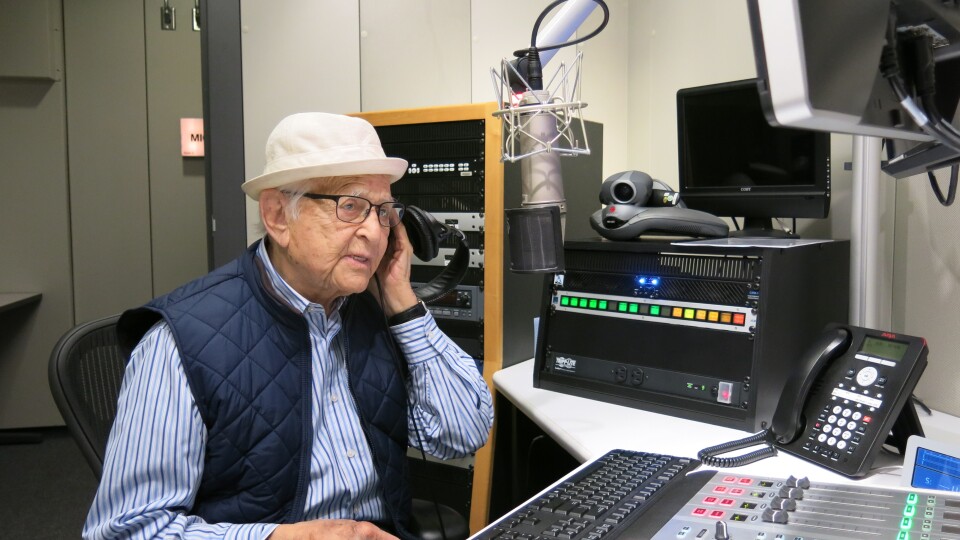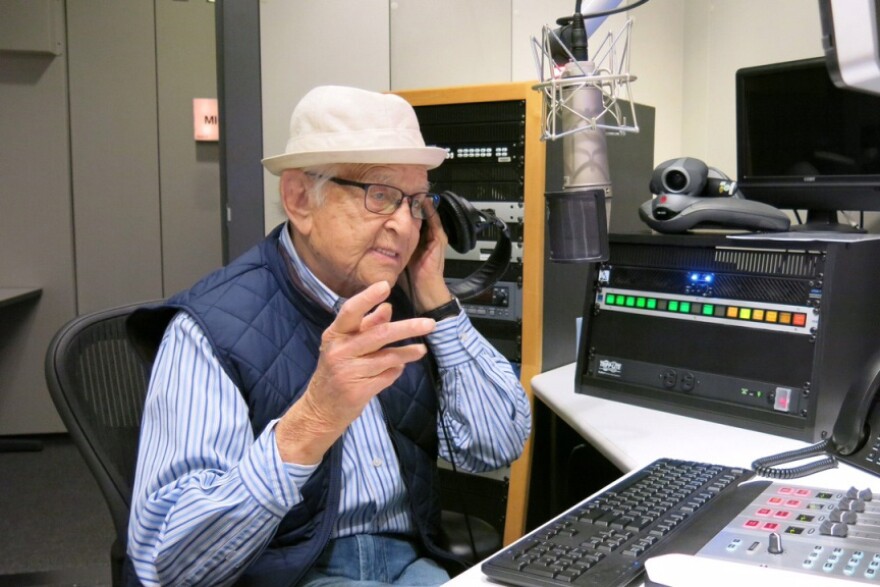The legendary TV producer is going strong at the age of 94, with a remake of "One Day at a Time" set for Netflix; Janelle Monáe tales a break from music to act in her debut feature film, “Moonlight”; could Facebook challenge TV networks and YouTube as a platform for live streaming?
Janelle Monáe on her first acting role and embracing otherness
Janelle Monáe is mostly known as a musician and performer, and an accomplished one at that.
She’s released three albums and has been nominated for numerous Grammy awards, including Best Contemporary R&B Album in 2011. But Monáe is taking a break from music to pursue an acting career.
She recently made her feature film debut in “Moonlight," where she plays Teresa, a mother-like figure to the main character, Chiron, who is a young man grappling with his sexual identity. Monáe is also starring alongside Taraji P. Hensen and Octavia Spencer in another movie called “Hidden Figures,” which comes out on Christmas Day.
The Frame spoke with Janelle Monáe about what she loves about acting, how she took inspiration from her mom for her role in "Moonlight," and why she connects with being an outcast.
INTERVIEW HIGHLIGHTS
On how her passion for acting came at a young age
I started to act when I was young. I just remember just having a spark when I used to do my Easter poem in my Baptist church, and I just had so much fun being in front of people and making them feel humorous. But my family would be proud when they would see me on stage.
On how her mother inspired her portrayal of Teresa in the film “Moonlight”
I see so much of my mom in Teresa. It's not even funny. When I think about just the strong African woman who was there for me and all of my cousins pretty much, she was always there to listen to us and not judge us.
My mom actually had to sacrifice her senior year in high school to give birth to me — that's a sacrifice. So I owe my mom so much, and she never tried to force me to become or be someone that I never spoke about being. She always encouraged me to follow my heart, and she knew how much I loved to entertain. My mom actually has wanted me to be in movies before my singing. She doesn't think I've made it until I've been in a movie.
On how she felt like an outcast when going to school for acting
I remember being the only black girl in pretty much all of my classes. So it was a big culture shock because I was coming from a predominately African-American school.
I have felt like the other when I went to the American Musical and Dramatic Academy for the acting program. I was the only black girl in all of my classes. It was hard sometimes feeling like, 'I don't think I have anyone in here who understands me. Do you understand me? Are you judging me?' There are times when people would come up to me and say certain things because of what they had seen on television or [because] they haven't been around a lot of black women, and they just ask questions about my hair, my dancing, or why I talk like that.
Sometimes it could be very frustrating feeling like an outcast and feeling like you don't have anyone that could relate to you. But because it's never addressed and it's uncomfortable for people to talk about, we just go on and we just interact in these surface-level ways. It's so silly. Just have a conversation.
Once I started to have more conversations, I started to become more vocal and passionate about telling stories about the other and making sure that the person who is oftentimes marginalized was seen in my videos and that they didn't feel so alone.
Norman Lear and the power of TV to start conversations
The legendary TV writer and producer Norman Lear is the subject of a new PBS documentary called "Just Another Version of You." The title is taken from a bumper sticker on his car. It's also how he views himself in the world: "At my core, that's what I feel. We are versions of one another."
Not surprisingly, a portion of the documentary is dedicated to Lear’s break-out hit show, “All in the Family.” The series, which launched in 1971, starred Rob Reiner as the hippie son-in-law Mike to Carroll O’Connor’s bigoted Archie Bunker, ran for eight seasons and, in the process, spawned the spin-offs “Maude” and “The Jeffersons.” It also branded Lear as a TV producer who made entertaining comedies about real people dealing with some of the most important issues of the day.
When Lear put “Good Times” on the air in 1974, it was the first time an African-American family was at the center of a network sitcom. Lear broke another television barrier when Bea Arthur contemplated an abortion on “Maude.” And he's still at it. Lear tells The Frame that he just completed a new version of "One Day at a Time," a Netflix series about three generations of a Cuban-American family starring Rita Moreno that will be released in January 2017.
To achieve his level of success, Lear has faced many conflicts and fostered many collaborations. When he visited The Frame, he shared some of his experiences from almost 50 years of life in the TV business.
Interview Highlights:
On collaboration and resolving conflicts:
Creator/collaborator or collaborator/creator, mine was a giant collaboration. I wasn't the only one. I had the last word, but there were a lot of people who had a lot to say. Certainly the black actors in these shows. There were times we didn't agree and I thought they were right the times we didn't agree and I thought they were wrong. The buck stopped with me, and I had to make those decisions. But I didn't feel as a white man that I couldn't make decisions that involved black actors because — you know, the title of my documentary is "Just Another Version of You," and at my core, that's what I feel. We are versions of one another. You may be black, a good deal younger than I, but you're a man, you're a person, and we have a common humanity. I've always felt that.

On how facing ageism when pitching his show "Guess Who Died," set in a retirement home:
They were saying it's not our demographic. That was always the statement: "Not our demographic. It's funny as hell, we think, but not our demographic." But what's happened now is the New York Times asked the women, Heidi Ewing and Rachel Grady, who made the documentary — the one we're talking about — they asked them to do a seven minute op-doc about "Guess Who Died." That op doc is so powerful... It sold the show.
On how "that's not our demographic" is a poor excuse for making shows about young, straight, white men:
And that's what they did. Everything you just talked about happened because young creative people pushed and pushed and got all of that going forward. We still have a long way to go on the race issue. When I think of how far LGBT issues came out, the whole issue came out, and where we are today with that, it's so clear how much media mattered in that regard. We have a long way to go with racial issues and such.
On TV's role in tackling social issues:
I don't know if it can lead the way, but it can certainly trigger conversation, and that's what I think it's all about. You couldn't look at some of those shows and not talk about it – I'm talking about some of the shows we do. If anybody's watching "South Park," the chances are they're talking about a lot of things the next day, because it's always dealing with something that's vital and giving really satirical scrutiny on something despite the fact that it's all about kids in South Park. It's a marvel.
To hear the interview click the play button at the top of the page or get The Frame podcast on iTunes.




